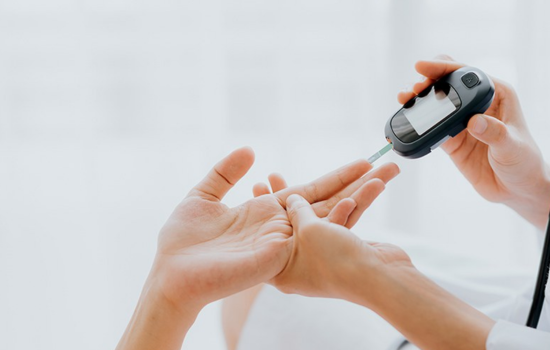Advertisements
Introduction
Diabetes is a serious condition that affects millions of people worldwide. Many people are looking for ways to control or even reverse the disease.
But it's important to remember that these tips may not work for everyone, and the support of a healthcare professional is always necessary. Let's look at some tips that can help and an app that may be helpful.
1. Healthy Eating
Advertisements
One of the most important things to manage diabetes is your diet. Eating fruits and vegetables and avoiding foods high in sugar and fat makes a big difference.
See also:
- Secret Recipe to Keep Blood Sugar Below 90
- Step by Step to Become an Ex-Hypertensive
- Hypertension Controlled With The Power Of Tea
- Application that helps you avoid traffic fines
- How to Protect Your WiFi Network from Intruders: Get to Know the Fing App
Choose whole-grain foods, such as brown rice, and avoid soft drinks and sweets. A diet rich in fiber helps control blood sugar levels, as fiber slows the absorption of sugar.
Advertisements
Nutritional Tips
- Eat more fiber: Foods such as oats, beans, apples and carrots are excellent sources of fiber.
- Avoid refined carbohydrates: change white bread for whole wheat bread, for example.
- Choose lean proteins: Skinless chicken, fish, and tofu are good options.
- Hydrate well: Drink plenty of water and avoid sugary drinks.
2. Regular Physical Exercise
Regular physical activity helps control your weight and blood sugar levels. Walking, swimming, cycling, or even dancing are all great options.
The important thing is to move and keep your body active. Physical exercise helps improve insulin sensitivity, which is essential for those with diabetes.
Recommended Types of Exercises
- Walks: A brisk 30-minute walk a day already brings many benefits.
- Resistance training: Using light weights or elastic bands helps strengthen muscles.
- Aerobic exercises: Activities such as swimming, running or dancing are excellent for cardiovascular health.
- Stretching: Maintaining body flexibility is important to avoid injuries.
3. Weight Control
Maintaining a healthy weight is crucial for people with diabetes. Excess weight can make it difficult to control blood sugar.
A balanced diet and exercise help keep weight under control. Even modest weight loss can improve glycemic control.
Strategies for Weight Control
- Eat slowlyChewing food well helps you eat less.
- Avoid skipping meals: Maintain a regular eating pattern.
- Make smaller portions: Use smaller plates to help control the amount of food.
- Plan your meals: Preparing healthy meals in advance helps avoid unhealthy choices.
4. Stress Management
Stress can affect blood sugar levels. Practicing relaxation techniques, such as meditation, yoga, or simply setting aside time to rest, can help manage stress and, consequently, diabetes.
Chronic stress can lead to elevated cortisol levels, which interfere with insulin.
Relaxation Techniques
- Meditation: Practice meditation for 10-15 minutes a day.
- Deep breathing: Take a few minutes to breathe deeply.
- Yoga: In addition to relaxing, it helps with flexibility and strength.
- Leisure: Have a hobby or activity that you enjoy to relax.
5. Sleep Well
Getting a good night's sleep is essential for overall health and managing diabetes. Aim for 7 to 8 hours of sleep per night, maintaining a regular bedtime and wake-up schedule. Lack of sleep can affect the hormones that regulate hunger and appetite.
Tips for Better Sleep
- Establish a routine: Go to bed and wake up at the same time every day.
- Create an enabling environment: Keep the room dark, quiet and cool.
- Avoid electronics before bed: Blue light from screens can interfere with sleep.
- Relax before sleeping: read a book or take a hot bath.
6. Monitor Sugar Levels
It's very important to regularly measure your blood sugar levels. This helps you understand how your body is responding to diet, exercise, and medications.
Write down the results and share them with your doctor. Monitoring glucose levels helps prevent long-term complications.
Monitoring Tools
- Glucometers: devices that measure blood sugar levels.
- Monitoring apps: applications such as mySugr help record glucose levels.
- Food diaries: Writing down what you eat can help identify patterns.
- Regular consultations: Take your notes to the doctor for evaluation.
7. Take Medications Correctly
If your doctor prescribes medication, it's important to take it as directed. Don't stop taking it on your own, even if you feel better.
Any changes should be discussed with your healthcare professional. Medications help keep glucose levels under control.
Tips for Taking Medications
- Follow the instructions: Take your medications at the correct times.
- Do not alter the dose: Only make changes with medical guidance.
- Use reminders: : Alarms on your cell phone can help you remember.
- Talk to your doctor: Report any side effects.
8. Visit the Doctor Regularly
Maintaining your health with regular visits to the doctor is essential. Your doctor can adjust treatment as needed and help prevent complications.
Regular check-ups help detect problems early.
Importance of Consultations
- General evaluation: The doctor can evaluate your complete health status.
- Laboratory tests: to check glucose, cholesterol and kidney function levels.
- Medication adjustment: The doctor may adjust the doses as needed.
- Prevention of complications: follow-up to avoid eye, kidney and foot problems.
9. Educate yourself about Diabetes
Learning more about the disease can help you make better decisions. There are many resources, such as books, videos, and reliable websites, that offer valuable information about diabetes. Information is power and can make a difference in managing the disease.
Sources of Information
- Specialized books: Look for books on diabetes in libraries or bookstores.
- Trusted sites: Visit websites of recognized health institutions.
- Educational videos: There are many videos online about diabetes management.
- Support groups: participate in support groups to share experiences.
10. Use Health Apps
Health apps can be great allies in managing diabetes. One example is the app mySugr, which helps monitor blood sugar levels, log meals, physical activity, and much more. This type of tool can make daily health tracking easier.
Benefits of mySugr
- Easy monitoring: Records glucose levels, meals and exercises.
- Detailed reports: generate reports to share with your doctor.
- Alerts and reminders: helps you remember to measure your glucose and take your medication.
- Integration with other devices: can be used with glucometers and other health apps.

Conclusion
Stopping diabetes is a huge challenge and may not be possible for everyone. The tips above are important steps that can help you manage your diabetes.
But always remember to follow your doctor's instructions and seek professional help when necessary. Using tools like health apps can make the process easier and more organized.
Remember: taking care of your health is a continuous journey. With determination, proper guidance, and support, it is possible to live well and manage diabetes.




